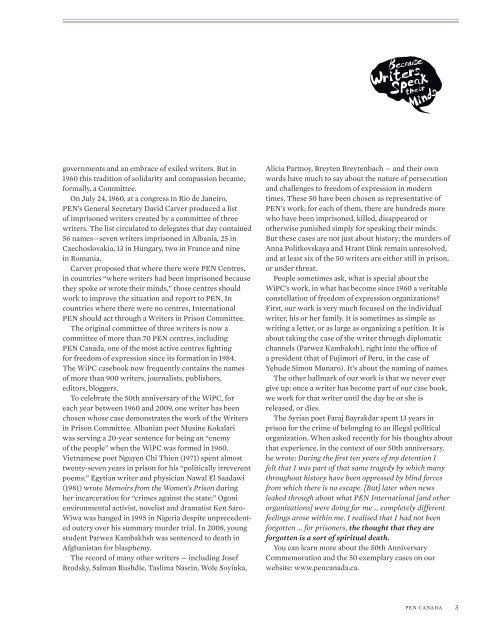writers in prison committee report - PEN Canada
writers in prison committee report - PEN Canada
writers in prison committee report - PEN Canada
You also want an ePaper? Increase the reach of your titles
YUMPU automatically turns print PDFs into web optimized ePapers that Google loves.
governments and an embrace of exiled <strong>writers</strong>. But <strong>in</strong><br />
1960 this tradition of solidarity and compassion became,<br />
formally, a Committee.<br />
On July 24, 1960, at a congress <strong>in</strong> Rio de Janeiro,<br />
<strong>PEN</strong>’s General Secretary David Carver produced a list<br />
of im<strong>prison</strong>ed <strong>writers</strong> created by a <strong>committee</strong> of three<br />
<strong>writers</strong>. The list circulated to delegates that day conta<strong>in</strong>ed<br />
56 names—seven <strong>writers</strong> im<strong>prison</strong>ed <strong>in</strong> Albania, 25 <strong>in</strong><br />
Czechoslovakia, 13 <strong>in</strong> Hungary, two <strong>in</strong> France and n<strong>in</strong>e<br />
<strong>in</strong> Romania.<br />
Carver proposed that where there were <strong>PEN</strong> Centres,<br />
<strong>in</strong> countries “where <strong>writers</strong> had been im<strong>prison</strong>ed because<br />
they spoke or wrote their m<strong>in</strong>ds,” those centres should<br />
work to improve the situation and <strong>report</strong> to <strong>PEN</strong>. In<br />
countries where there were no centres, International<br />
<strong>PEN</strong> should act through a Writers <strong>in</strong> Prison Committee.<br />
The orig<strong>in</strong>al <strong>committee</strong> of three <strong>writers</strong> is now a<br />
<strong>committee</strong> of more than 70 <strong>PEN</strong> centres, <strong>in</strong>clud<strong>in</strong>g<br />
<strong>PEN</strong> <strong>Canada</strong>, one of the most active centres fight<strong>in</strong>g<br />
for freedom of expression s<strong>in</strong>ce its formation <strong>in</strong> 1984.<br />
The WiPC casebook now frequently conta<strong>in</strong>s the names<br />
of more than 900 <strong>writers</strong>, journalists, publishers,<br />
editors, bloggers.<br />
To celebrate the 50th anniversary of the WiPC, for<br />
each year between 1960 and 2009, one writer has been<br />
chosen whose case demonstrates the work of the Writers<br />
<strong>in</strong> Prison Committee. Albanian poet Mus<strong>in</strong>e Kokalari<br />
was serv<strong>in</strong>g a 20-year sentence for be<strong>in</strong>g an “enemy<br />
of the people” when the WiPC was formed <strong>in</strong> 1960.<br />
Vietnamese poet Nguyen Chi Thien (1971) spent almost<br />
twenty-seven years <strong>in</strong> <strong>prison</strong> for his “politically irreverent<br />
poems;” Egytian writer and physician Nawal El Saadawi<br />
(1981) wrote memoirs from the women’s <strong>prison</strong> dur<strong>in</strong>g<br />
her <strong>in</strong>carceration for “crimes aga<strong>in</strong>st the state;” Ogoni<br />
environmental activist, novelist and dramatist Ken Saro-<br />
Wiwa was hanged <strong>in</strong> 1995 <strong>in</strong> Nigeria despite unprecedented<br />
outcry over his summary murder trial. In 2008, young<br />
student Parwez Kambakhsh was sentenced to death <strong>in</strong><br />
Afghanistan for blasphemy.<br />
The record of many other <strong>writers</strong> — <strong>in</strong>clud<strong>in</strong>g Josef<br />
Brodsky, Salman Rushdie, Taslima Nasr<strong>in</strong>, Wole Soy<strong>in</strong>ka,<br />
50 years of defend<strong>in</strong>g freedom of expression<br />
Writers <strong>in</strong> Prison Committee • International pen<br />
Alicia Partnoy, Breyten Breytenbach — and their own<br />
words have much to say about the nature of persecution<br />
and challenges to freedom of expression <strong>in</strong> modern<br />
times. These 50 have been chosen as representative of<br />
<strong>PEN</strong>’s work; for each of them, there are hundreds more<br />
who have been im<strong>prison</strong>ed, killed, disappeared or<br />
otherwise punished simply for speak<strong>in</strong>g their m<strong>in</strong>ds.<br />
But these cases are not just about history; the murders of<br />
Anna Politkovskaya and Hrant D<strong>in</strong>k rema<strong>in</strong> unresolved,<br />
and at least six of the 50 <strong>writers</strong> are either still <strong>in</strong> <strong>prison</strong>,<br />
or under threat.<br />
People sometimes ask, what is special about the<br />
WiPC’s work, <strong>in</strong> what has become s<strong>in</strong>ce 1960 a veritable<br />
constellation of freedom of expression organizations?<br />
First, our work is very much focused on the <strong>in</strong>dividual<br />
writer, his or her family. It is sometimes as simple as<br />
writ<strong>in</strong>g a letter, or as large as organiz<strong>in</strong>g a petition. It is<br />
about tak<strong>in</strong>g the case of the writer through diplomatic<br />
channels (Parwez Kambaksh), right <strong>in</strong>to the office of<br />
a president (that of Fujimori of Peru, <strong>in</strong> the case of<br />
Yehude Simon Munaro). It’s about the nam<strong>in</strong>g of names.<br />
The other hallmark of our work is that we never ever<br />
give up; once a writer has become part of our case book,<br />
we work for that writer until the day he or she is<br />
released, or dies.<br />
The Syrian poet Faraj Bayrakdar spent 13 years <strong>in</strong><br />
<strong>prison</strong> for the crime of belong<strong>in</strong>g to an illegal political<br />
organization. When asked recently for his thoughts about<br />
that experience, <strong>in</strong> the context of our 50th anniversary,<br />
he wrote: dur<strong>in</strong>g the first ten years of my detention i<br />
felt that i was part of that same tragedy by which many<br />
throughout history have been oppressed by bl<strong>in</strong>d forces<br />
from which there is no escape. [but] later when news<br />
leaked through about what pen <strong>in</strong>ternational [and other<br />
organizations] were do<strong>in</strong>g for me … completely different<br />
feel<strong>in</strong>gs arose with<strong>in</strong> me. i realised that i had not been<br />
forgotten ... for <strong>prison</strong>ers, the thought that they are<br />
forgotten is a sort of spiritual death.<br />
You can learn more about the 50th Anniversary<br />
Commemoration and the 50 exemplary cases on our<br />
website: www.pencanada.ca.<br />
<strong>PEN</strong> CANADA 3




